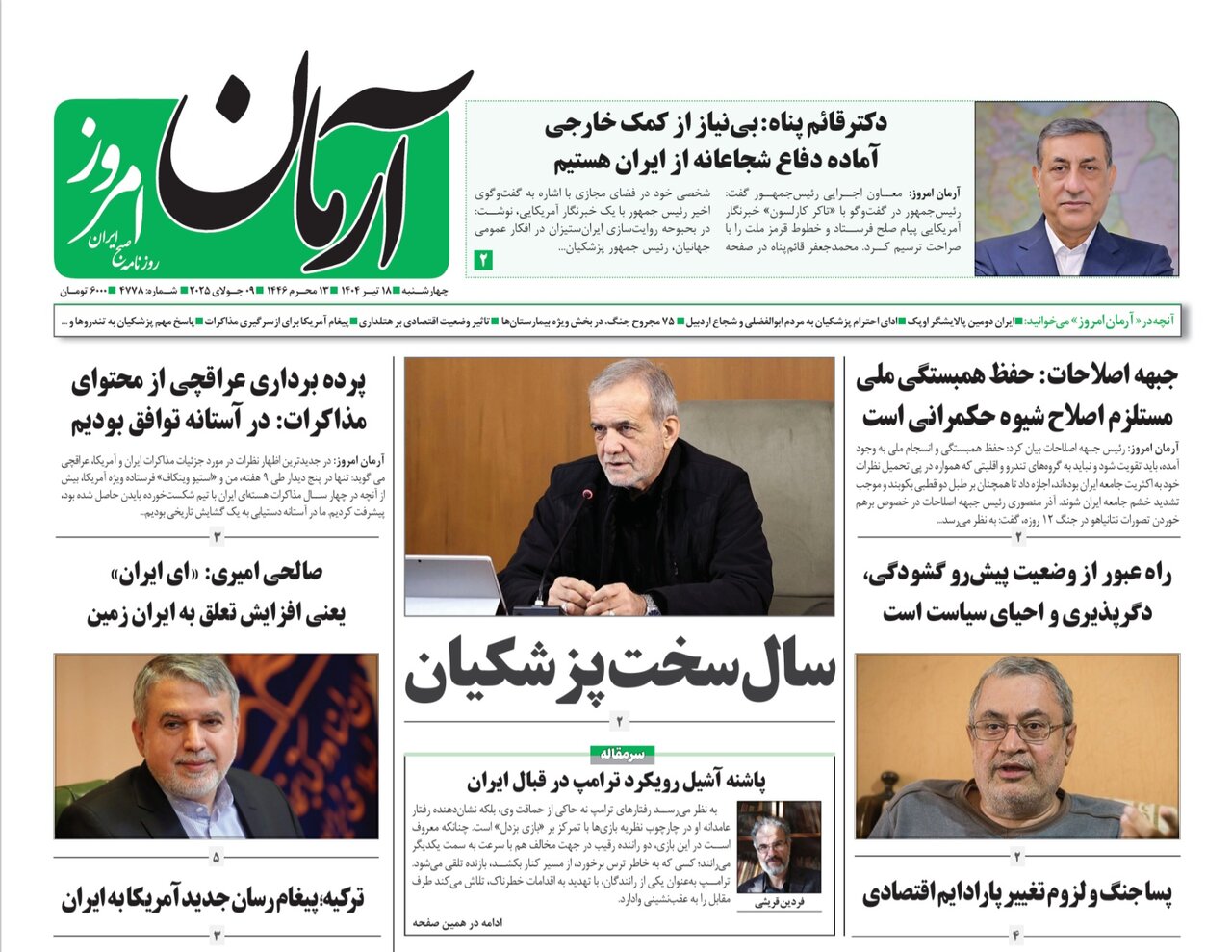“Economic satisfaction” as a pillar of deterrence

TEHRAN - In a recent editorial, Arman-e-Emrooz addressed a crucial yet often overlooked aspect of national deterrence amid escalating regional tensions and the ongoing confrontation—direct or indirect—between Iran and Israel.
While much attention is rightfully given to military strength, missile capability, geopolitical maneuvering, and regional alliances, another powerful deterrent lies closer to home: the satisfaction and trust of the people. Deterrence is not confined to weaponry or strategy alone—it also unfolds in the minds and morale of the population. History consistently shows that nations bound by solidarity and trust in their leadership demonstrate greater resilience in times of crisis. Public contentment, manifesting as widespread acceptance of the legitimacy of a government's defense policies, fosters national unity and strength. As Iran navigates one of the most sensitive geopolitical periods in its recent history, the importance of an engaged, hopeful, and economically secure population cannot be overstated. No missile or military strategy offers as much lasting security as a citizenry that believes in the direction of its country. To this end, economic revitalization, the fight against corruption, and the rebuilding of public trust are not merely domestic concerns—they are strategic imperatives. These pillars are vital for both national cohesion and for bolstering Iran’s standing in negotiations with external powers.
Khorasan: Iran at crossroads of seizing opportunity or repeating past trade policies
In a recent analysis, Khorasan examined Iran’s persistent struggle to tap into the vast economic potential offered by its Persian Gulf neighbors. Over the past decade, Iran’s trade relations with the member states of the Persian Gulf Cooperation Council have remained limited—an outcome that cannot simply be attributed to natural trade fluctuations or market dynamics. Structural obstacles, including underdeveloped infrastructure and a private sector ill-equipped to meet the specific demands of regional markets, have significantly widened the trade gap between Iran and these countries. These factors reflect systemic shortcomings rather than circumstantial limitations. Despite its geographical proximity and cultural ties to the region, Iran has yet to secure a meaningful share in the booming markets of the Persian Gulf. This missed opportunity not only represents a loss in economic value but also hinders the country’s broader strategic positioning in the region. To reverse this trend, Iran must prioritize pragmatic economic reforms, invest in trade infrastructure, and cultivate a more competitive and responsive private sector. Otherwise, it risks remaining on the sidelines of one of the world's most dynamic economic corridors. While Turkey, India, and China are expanding their economic influence in the region, Iran is still engaged in repeating trade with one or two partners in the Persian Gulf region. If a new approach is adopted at the governance level to diversify, facilitate infrastructure, and redefine relations with neighbors, it is hoped that Iran's share of the Persian Gulf opportunity will be restored in proportion to its geographical and cultural weight.
Shargh: From lifting sanctions to damage compensation and enrichment ceiling
In a recent article, Shargh explored Iran’s stance on returning to nuclear negotiations with the United States, amid a backdrop of mounting tensions and stalled diplomacy. The talks—which inched forward in Oman—now lie dormant, eclipsed by military confrontations against Iran and deep distrust. Speculation is growing about the possibility of renewed dialogue, yet Tehran has made clear that it will not re-enter negotiations without concrete preconditions. These include the full lifting of sanctions, a defined cap on uranium enrichment, and compensation for the damage caused by military strikes. These demands reflect a major shift in tone—indicating that Iran seeks more than symbolic gestures. It wants verifiable guarantees that its nuclear rights will be respected. The current debate extends far beyond technical details such as centrifuge counts. At stake is the credibility of diplomacy itself, conducted under the looming threat of force. While Washington pushes for a swift return to talks, Tehran insists that an agreement must be reached on equal footing—not with one party holding a gun at the table. This conditional posture signals that Iran remains open to negotiation—but only one grounded in mutual recognition, accountability, and assurance.
Siasat-e-Rooz: We should stand strong
In its editorial, Siasat-e-Rooz emphasizes the importance of projecting strong and authoritative power in the aftermath of a 12-day war involving Iran. It wrote: Israel, the United States, and several European nations entered an unequal war against Iran. Ultimately the United States called for a ceasefire. There is a prevailing sense of national pride within Iran about the war. People viewed Iran’s performance as a victory despite extensive propaganda and psychological warfare by the adversaries. This triumph fostered public confidence in Iran’s defensive power. However, any discussion of negotiations with the U.S. lacks political credibility as Trump keeps claiming to have destroyed Iran's nuclear infrastructure. In such an environment, the rationale for future talks comes under question. If such claims were true, it suggests, there would be nothing left to negotiate. A lack of assertive language and action only emboldens adversaries to demand submission in exchange for concessions. When we do not speak strongly it will embolden Trump to say, "If Iran listens like Syria, I will lift the sanctions!"
